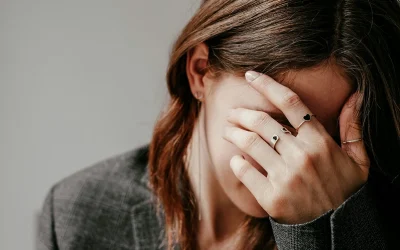From Therapy to Medication: What Is the Treatment for Anxiety and Depression?

Seeking treatment is important because effective care can improve daily functioning, strengthen relationships, and promote long-term mental and physical health. With the right support, many people can regain balance and live more fulfilling lives.
Treatment for anxiety and depression often involves a combination of therapy and medication. The approach depends on the severity of symptoms, personal preferences, and individual health needs. For some, therapy alone may be enough, while others may benefit from medication or a blend of both to achieve the best results.
Anxiety Disorders
Anxiety disorders are mental health conditions that go beyond the normal feelings of stress or worry. While occasional anxiety is a natural response to life’s challenges, anxiety disorders involve persistent, excessive fear or nervousness that does not go away and can worsen over time. These conditions can interfere with how a person thinks, feels, and behaves, often making daily life difficult to manage.
- Generalized Anxiety Disorder (GAD): Characterized by ongoing, uncontrollable worry about everyday situations such as work, health, or family.
- Panic Disorder: Involves sudden, repeated episodes of intense fear or panic attacks that may cause chest pain, shortness of breath, or dizziness.
- Social Anxiety Disorder: Marked by extreme fear of social interactions, often leading to avoidance of situations where a person may feel judged or embarrassed.
Depression Symptoms
Depression is more than just feeling sad or having a low mood from time to time. It is a serious mental health condition that can affect the way a person thinks, feels, and behaves. Symptoms can vary from person to person, but common signs often include:
- Persistent sadness or emptiness that lasts for weeks or longer.
- Fatigue or lack of energy that makes daily tasks feel overwhelming.
- Changes in appetite or weight, either eating too much or too little.
- Sleep problems, such as insomnia or sleeping excessively.
- Difficulty concentrating or making decisions.
- Loss of interest in hobbies, work, or activities once enjoyed.
Mild Depression
- Regular exercise to boost energy levels and release mood-enhancing endorphins.
- Balanced nutrition to support overall health and brain function.
- Quality sleep to restore energy and regulate emotions.
- Mindfulness or relaxation practices like meditation, yoga, or deep breathing.
- Short-term therapy, such as cognitive behavioral therapy (CBT) or interpersonal therapy, to address negative thought patterns.
Mental Health Conditions
Anxiety and depression are part of a broader spectrum of mental health conditions that affect millions of people worldwide. Mental health conditions include a wide range of challenges, from mood disorders to anxiety disorders, that can influence the way a person thinks, feels, and interacts with others. These conditions are not signs of weakness but medical issues that require proper care and understanding.
- Therapy, including cognitive behavioral therapy (CBT) or interpersonal therapy, which targets negative thinking patterns and relationship challenges.
- Medication like antidepressants or anti-anxiety medications to balance brain chemistry.
- Lifestyle changes such as improving sleep, exercise, and nutrition to support overall well-being.
Mental Health and Primary Care
- Psychiatrists who can prescribe and manage medications.
- Therapists or counselors who provide talk therapy and coping strategies.
- Support groups or community resources for ongoing encouragement.
Health Conditions and Mental Health
- Diabetes may lead to mood changes due to fluctuating blood sugar levels and the stress of daily management.
- Thyroid issues can cause hormonal imbalances that mimic or worsen symptoms of depression and anxiety.
- Heart disease often leads to lifestyle restrictions and concerns about mortality, which may increase feelings of fear or hopelessness.
Interpersonal Therapy
- Improving communication skills to reduce misunderstandings and strengthen relationships.
- Resolving conflicts that contribute to stress or emotional struggles.
- Building stronger social support networks to reduce feelings of isolation.
- Adjusting to life transitions such as divorce, job changes, or loss.
Anti-Anxiety Medication
- Benzodiazepines such as lorazepam or diazepam, which act quickly to reduce intense anxiety but carry a higher risk of dependency, are usually prescribed for short-term.
- Selective Serotonin Reuptake Inhibitors (SSRIs) like sertraline or escitalopram, often considered first-line treatments for anxiety disorders due to their effectiveness and lower risk of dependency.
- Serotonin-Norepinephrine Reuptake Inhibitors (SNRIs) such as venlafaxine or duloxetine which can also help regulate mood and reduce anxiety symptoms.
Prescribe Antidepressants
- Selective Serotonin Reuptake Inhibitors (SSRIs): Often the first choice because they are effective and have fewer side effects. Examples include fluoxetine and sertraline.
- Serotonin-Norepinephrine Reuptake Inhibitors (SNRIs): Help regulate both serotonin and norepinephrine, making them useful for depression and certain anxiety disorders. Examples include venlafaxine and duloxetine.
- Atypical Antidepressants: A varied group that works differently from SSRIs and SNRIs, sometimes prescribed when other medications are not effective. Examples include bupropion and mirtazapine.
Antidepressant Discontinuation Syndrome
- Dizziness or lightheadedness that can affect daily activities.
- Mood changes such as irritability, sadness, or sudden anxiety.
- Flu-like feelings, including headaches, fatigue, or muscle aches.
- Sleep disturbances such as vivid dreams or insomnia.
- “Brain zaps” or electrical sensations in the head, often reported when stopping certain medications.
Combining Therapy and Medication
- Severity of symptoms to determine whether medication is necessary alongside therapy.
- Lifestyle and daily routines to ensure the treatment fits into the patient’s life.
- Patient preferences regarding therapy methods, medication use, or holistic approaches.
- Other health conditions that may influence which treatments are safe and effective.
Explore the Right Treatment for Anxiety and Depression: How FPSCA Can Support You
- Adherence to the Latest Standards: We follow strict American Psychological Association and World Health Organization guidelines to ensure safe, up-to-date medication practices.
- Tailored Evaluations: Each medication management plan is customized based on your symptoms, lifestyle, medical history, and long-term mental health goals.
- Comprehensive Care: In addition to medication management, FPSCA offers psychotherapy and neurofeedback to supplement your treatment. This integrated approach helps reduce symptoms while teaching valuable coping strategies.
Start Your Personalized Anxiety and Depression Treatment at FPSCA
Related
Understanding the Connection Between Ketamine and Anxiety Relief
Anxiety disorders are among the most common mental health conditions, affecting...
How Much Is Ketamine Treatment for Depression? Costs, Factors, and What to Expect
Ketamine therapy has emerged as a promising treatment option for individuals...
Setting Effective Treatment Goals for Anxiety at FPSCA
At FPSCA, the focus is on supporting individuals who are living with anxiety by...


